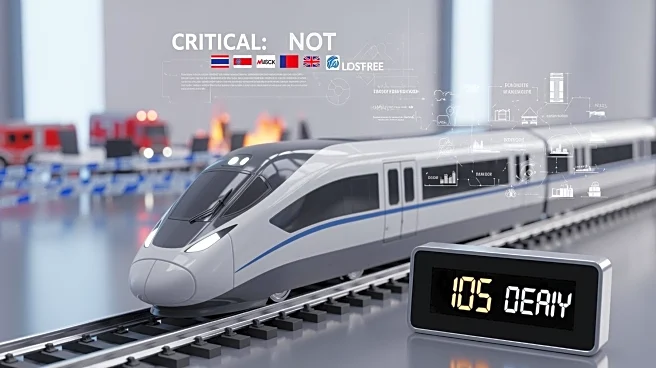What's Happening?
The HS2 high-speed rail project has announced a four-year delay in connecting to the West Coast Mainline. This decision follows a comprehensive reset initiated by Mark Wild, the new chief executive of
HS2, who aims to focus resources on completing the stretch between Old Oak Common and Birmingham Curzon Street. The delay affects the 29-kilometer section between Birmingham and Handsacre, originally halted in early 2023 to reduce costs. Despite the deferral, essential works such as the realignment of the A38 and completion of the A5 bridge will continue. HS2 Ltd emphasizes the need to address past mistakes and prioritize taxpayer money while ensuring the benefits of HS2 are realized quickly.
Why It's Important?
The delay in the HS2 project has significant implications for the UK's transportation infrastructure and economic landscape. The project, initially estimated to cost £33 billion, has faced criticism for its escalating costs and schedule challenges. The deferral may impact businesses and passengers relying on improved connectivity and economic growth associated with the project. The focus on completing the southern section aims to deliver benefits sooner, but the delay in northern connections could affect regional development and investment. Stakeholders, including construction firms and local communities, may face uncertainty and potential financial repercussions.
What's Next?
HS2 Ltd plans to continue essential construction in the affected area while renegotiating contracts with key joint ventures, including Balfour Beatty Vinci and Eiffage Kier Ferrovial Bam Nuttall. The reset aims to ensure the project's feasibility and address cost overruns. The Public Accounts Committee has criticized HS2's management, calling for accountability and transparency. Future steps involve rebaselining contracts and prioritizing critical northern works to achieve a realistic schedule. Stakeholders will closely monitor developments, seeking clarity on timelines and financial impacts.
Beyond the Headlines
The HS2 delay highlights broader challenges in managing large-scale infrastructure projects, including cost control and effective scheduling. The project's setbacks may prompt discussions on public spending efficiency and strategic planning in transportation initiatives. Ethical considerations arise regarding taxpayer money usage and the project's long-term benefits versus immediate costs. The delay may also influence future policy decisions on infrastructure investment and regional development priorities.









